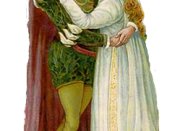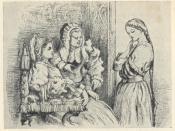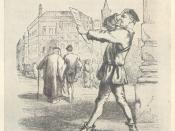Shakespeare Module
Romeo and Juliet
Writing about the scene
1.
In the time Romeo and Juliet was written and set, the father was very much the head of the household. He was to be respected by all the family and his daughters especially would have been expected to obey his commands. In the case of Capulet and Juliet, this is quite apparent. Perhaps this is because she is an only child, or perhaps because of the type of person Capulet is.
This scene is full of dramatic irony. When Capulet first enters, he still thinks she is crying because of Tybalt's death. He tries to sympathise and believes marrying Paris would make her happy and would be the best thing for everyone. But of course the audience know she is crying because of Romeo.
Lady Capulet then informs him that she will not marry Paris and he begins asking a lot of questions;
"How, will she none? Doth she not give us thanks?
Is she not proud? Doth she not count her blest,
unworthy as she is, that we wrought
so worthy a gentleman to be her bride?"
He comes across as embarrassed, being put out of his place slightly.
It is most likely that Juliet has never before disobeyed his commands and he is obviously quite insulted by this too.
When he enters the room where Juliet is, all hell is let lose. We imagine that as his speech develops, so does his anger. He does not let Juliet tell her side of the story. He screams sarcastic remarks, insults her and commands her to attend the church on Thursday, where she is due to wed Paris;
"Thank me no thankings, nor proud me no prouds,
But fettle your fine joints 'gainst Thursday next,
To go with Paris to...


